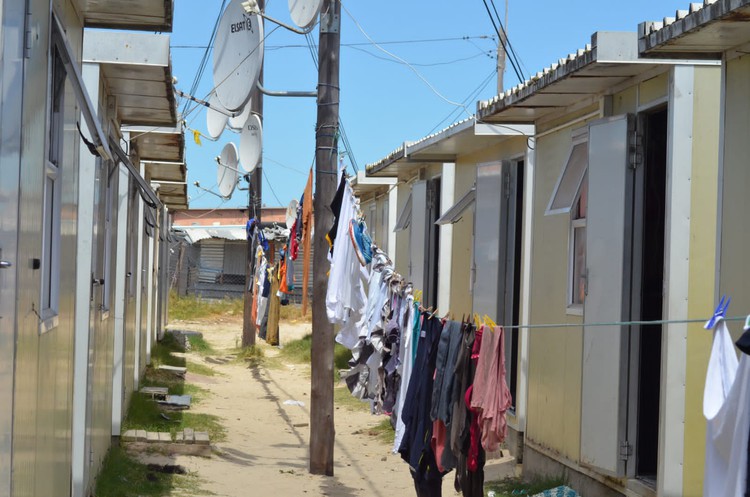No more space for large-scale housing projects, says Western Cape government
Families relocated to Delft say their living conditions have become unbearable
Families who were moved by government to a temporary relocation site in Delft, Cape Town, from 2018, now want them to to fulfill a promise to relocate them to adequate accommodation. But the provincial human settlements department says it’s running out of well-located large parcels of land available for housing developments. Photo: Nombulelo Damba-Hendrik
- Fire victims and other residents moved to a temporary relocation site in Delft years ago want the provincial government and the City of Cape Town to move them to houses.
- Human Settlements in the Western Cape says that an increase in land occupations over the past two years has “severely impacted” its housing projects and decreased the space available to provide emergency housing sites.
The Western Cape provincial government says it’s running out of well-located large parcels of land available for housing developments.
This comes as families who were victims of a fire four years ago in Langa are pleading with the Western Cape Department of Human Settlements and City of Cape Town to fulfil a promise to relocate them to adequate accommodation.
In 2018, the families were moved from Joe Slovo informal settlement in Langa to a temporary relocation site in Delft, known as TRA6. According to residents, they were told by officials that they would be relocated from the site after six months.
Community leader Thembile Nikiwe said residents were angry that the government has plans to move more people into the temporary relocation area with no mention of relocating them.
Nikiwe said some qualifying families were even told they would benefit from the Joe Slovo N2 Gateway housing development. But applications for the development are now closed.
Resident Sophia Nkosi, 70, was moved from a backyard in KTC to Delft in 2019. Nkosi said once she was approved for a house, she was moved to the temporary relocation area, but has not heard from officials since then. She lives in a one-room prefab structure situated a distance from the communal toilets.
“I have no choice but to use a bucket when I want to relieve myself at night. The roof is leaking because it’s old. There is also [stagnant] dirty water on the ground and it stinks a lot,” she said.
Western Cape Department of Human Settlement spokesperson Nathan Adriaanse told GroundUp that the increase in land occupations in Cape Town metro over the past two years has “severely impacted” housing projects and decreased the space available to provide emergency housing sites.
“The continuous occupation of land suitable for housing developments, further minimises opportunities for qualifying approved beneficiaries. Land parcels are often located on the urban edge, away from people’s livelihoods and further promoting urban sprawl,” said Adriaanse. He said most larger well-located vacant land in the city is privately owned.
Adriaanse said that the department was unable to make any progress with phase 3 of the Joe Slovo N2 Gateway project “due to the influx of illegal occupants” and people refusing to move to temporary housing along Jakes Gerwel Drive.
Adriaanse said the forceful occupation of the Jakes Gerwel site has meant that no further construction can take place, jeopardising future projects for residents of Joe Slovo informal settlement.
Adriaanse said that once a project can be completed, qualifying beneficiaries will be relocated. “We are engaging internally to make more space available within Forest Village for N2 Gateway or TRA 6 beneficiaries but this is not guaranteed,” he said.
Next: CCMA upholds yet another “anti-vaxxer” dismissal
Previous: Auditor accused 3Sixty managers of “constructing evidence”
© 2022 GroundUp. This article is licensed under a Creative Commons Attribution-NoDerivatives 4.0 International License.
You may republish this article, so long as you credit the authors and GroundUp, and do not change the text. Please include a link back to the original article.
We put an invisible pixel in the article so that we can count traffic to republishers. All analytics tools are solely on our servers. We do not give our logs to any third party. Logs are deleted after two weeks. We do not use any IP address identifying information except to count regional traffic. We are solely interested in counting hits, not tracking users. If you republish, please do not delete the invisible pixel.



